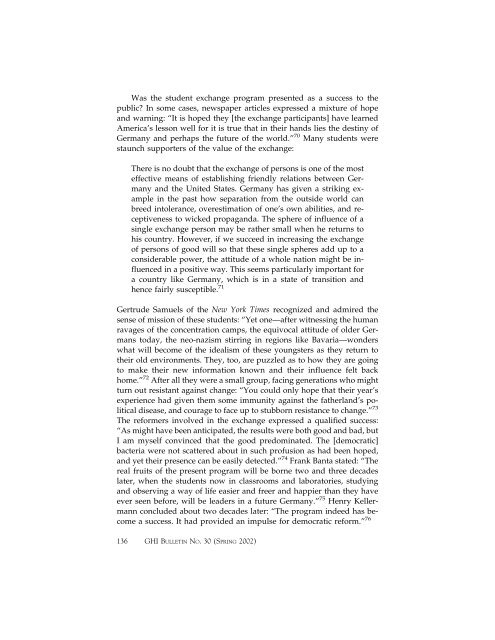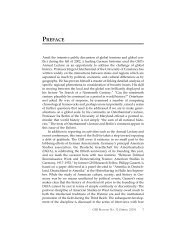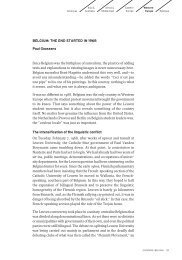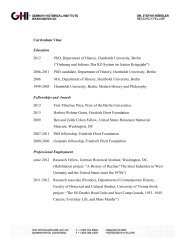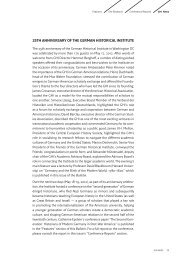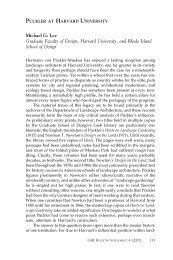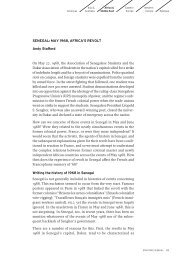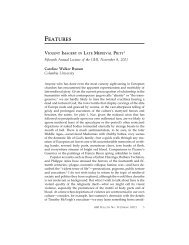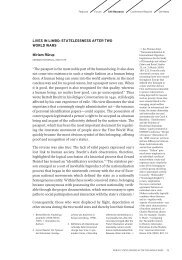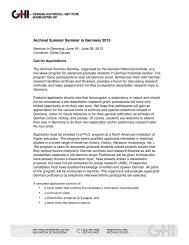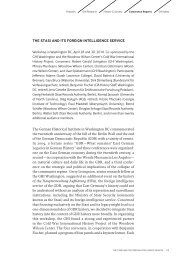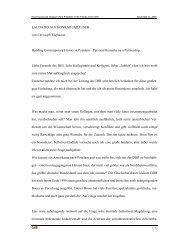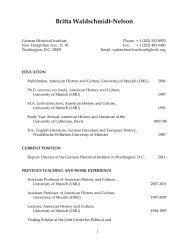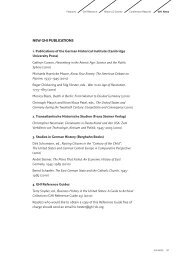German Student Exchange Programs in the United States, 1946-1952
German Student Exchange Programs in the United States, 1946-1952
German Student Exchange Programs in the United States, 1946-1952
You also want an ePaper? Increase the reach of your titles
YUMPU automatically turns print PDFs into web optimized ePapers that Google loves.
Was <strong>the</strong> student exchange program presented as a success to <strong>the</strong><br />
public? In some cases, newspaper articles expressed a mixture of hope<br />
and warn<strong>in</strong>g: “It is hoped <strong>the</strong>y [<strong>the</strong> exchange participants] have learned<br />
America’s lesson well for it is true that <strong>in</strong> <strong>the</strong>ir hands lies <strong>the</strong> dest<strong>in</strong>y of<br />
<strong>German</strong>y and perhaps <strong>the</strong> future of <strong>the</strong> world.” 70 Many students were<br />
staunch supporters of <strong>the</strong> value of <strong>the</strong> exchange:<br />
There is no doubt that <strong>the</strong> exchange of persons is one of <strong>the</strong> most<br />
effective means of establish<strong>in</strong>g friendly relations between <strong>German</strong>y<br />
and <strong>the</strong> <strong>United</strong> <strong>States</strong>. <strong>German</strong>y has given a strik<strong>in</strong>g example<br />
<strong>in</strong> <strong>the</strong> past how separation from <strong>the</strong> outside world can<br />
breed <strong>in</strong>tolerance, overestimation of one’s own abilities, and receptiveness<br />
to wicked propaganda. The sphere of <strong>in</strong>fluence of a<br />
s<strong>in</strong>gle exchange person may be ra<strong>the</strong>r small when he returns to<br />
his country. However, if we succeed <strong>in</strong> <strong>in</strong>creas<strong>in</strong>g <strong>the</strong> exchange<br />
of persons of good will so that <strong>the</strong>se s<strong>in</strong>gle spheres add up to a<br />
considerable power, <strong>the</strong> attitude of a whole nation might be <strong>in</strong>fluenced<br />
<strong>in</strong> a positive way. This seems particularly important for<br />
a country like <strong>German</strong>y, which is <strong>in</strong> a state of transition and<br />
hence fairly susceptible. 71<br />
Gertrude Samuels of <strong>the</strong> New York Times recognized and admired <strong>the</strong><br />
sense of mission of <strong>the</strong>se students: “Yet one—after witness<strong>in</strong>g <strong>the</strong> human<br />
ravages of <strong>the</strong> concentration camps, <strong>the</strong> equivocal attitude of older <strong>German</strong>s<br />
today, <strong>the</strong> neo-nazism stirr<strong>in</strong>g <strong>in</strong> regions like Bavaria—wonders<br />
what will become of <strong>the</strong> idealism of <strong>the</strong>se youngsters as <strong>the</strong>y return to<br />
<strong>the</strong>ir old environments. They, too, are puzzled as to how <strong>the</strong>y are go<strong>in</strong>g<br />
to make <strong>the</strong>ir new <strong>in</strong>formation known and <strong>the</strong>ir <strong>in</strong>fluence felt back<br />
home.” 72 After all <strong>the</strong>y were a small group, fac<strong>in</strong>g generations who might<br />
turn out resistant aga<strong>in</strong>st change: “You could only hope that <strong>the</strong>ir year’s<br />
experience had given <strong>the</strong>m some immunity aga<strong>in</strong>st <strong>the</strong> fa<strong>the</strong>rland’s political<br />
disease, and courage to face up to stubborn resistance to change.” 73<br />
The reformers <strong>in</strong>volved <strong>in</strong> <strong>the</strong> exchange expressed a qualified success:<br />
“As might have been anticipated, <strong>the</strong> results were both good and bad, but<br />
I am myself conv<strong>in</strong>ced that <strong>the</strong> good predom<strong>in</strong>ated. The [democratic]<br />
bacteria were not scattered about <strong>in</strong> such profusion as had been hoped,<br />
and yet <strong>the</strong>ir presence can be easily detected.” 74 Frank Banta stated: “The<br />
real fruits of <strong>the</strong> present program will be borne two and three decades<br />
later, when <strong>the</strong> students now <strong>in</strong> classrooms and laboratories, study<strong>in</strong>g<br />
and observ<strong>in</strong>g a way of life easier and freer and happier than <strong>the</strong>y have<br />
ever seen before, will be leaders <strong>in</strong> a future <strong>German</strong>y.” 75 Henry Kellermann<br />
concluded about two decades later: “The program <strong>in</strong>deed has become<br />
a success. It had provided an impulse for democratic reform.” 76<br />
136 GHI BULLETIN NO. 30(SPRING 2002)


